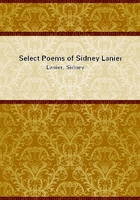
第25章 CHAP. VII.(5)
Sec. 93. In absolute monarchies indeed, as well as other governments of the world, the subjects have an appeal to the law, and judges to decide any controversies, and restrain any violence that may happen betwixt the subjects themselves, one amongst another. This every one thinks necessary, and believes he deserves to be thought a declared enemy to society and mankind, who should go about to take it away. But whether this be from a true love of mankind and society, and such a charity as we owe all one to another, there is reason to doubt: for this is no more than what every man, who loves his own power, profit, or greatness, may and naturally must do, keep those animals from hurting, or destroying one another, who labour and drudge only for his pleasure and advantage; and so are taken care of, not out of any love the master has for them, but love of himself, and the profit they bring him: for if it be asked, what security, what fence is there, in such a state, against the violence and oppression of this absolute ruler? the very question can scarce be borne. They are ready to tell you, that it deserves death only to ask after safety. Betwixt subject and subject, they will grant, there must be measures, laws and judges, for their mutual peace and security: but as for the ruler, he ought to be absolute, and is above all such circumstances; because he has power to do more hurt and wrong, it is right when he does it. To ask how you may be guarded from harm, or injury, on that side where the strongest hand is to do it, is presently the voice of faction and rebellion: as if when men quitting the state of nature entered into society, they agreed that all of them but one, should be under the restraint of laws, but that he should still retain all the liberty of the state of nature, increased with power, and made licentious by impunity. This is to think, that men are so foolish, that they take care to avoid what mischiefs may be done them by pole-cats, or foxes; but are content, nay, think it safety, to be devoured by lions.
Sec. 94. But whatever flatterers may talk to amuse people's understandings, it hinders not men from feeling; and when they perceive, that any man, in what station soever, is out of the bounds of the civil society which they are of, and that they have no appeal on earth against any harm, they may receive from him, they are apt to think themselves in the state of nature, in respect of him whom they find to be so; and to take care, as soon as they can, to have that safety and security in civil society, for which it was first instituted, and for which only they entered into it. And therefore, though perhaps at first , (as shall be shewed more at large hereafter in the following part of this discourse) some one good and excellent man having got a pre -eminency amongst the rest, had this deference paid to his goodness and virtue, as to a kind of natural authority, that the chief rule, with arbitration of their differences, by a tacit consent devolved into his hands, without any other caution, but the assurance they had of his uprightness and wisdom; yet when time, giving authority, and (as some men would persuade us)sacredness of customs, which the negligent, and unforeseeing innocence of the first ages began, had brought in successors of another stamp, the people finding their properties not secure under the government, as then it was, (whereas government has no other end but the preservation of * property) could never be safe nor at rest, nor think themselves in civil society, till the legislature was placed in collective bodies of men, call them senate, parliament, or what you please. By which means every single person became subject, equally with other the meanest men, to those laws, which he himself, as part of the legislative, had established; nor could any one, by his own authority; avoid the force of the law, when once made; nor by any pretence of superiority plead exemption, thereby to license his own, or the miscarriages of any of his dependents.** No man in civil society can be exempted from the laws of it: for if any man may do what he thinks fit, and there be no appeal on earth, for redress or security against any harm he shall do; I ask, whether he be not perfectly still in the state of nature, and so can be no part or member of that civil society; unless any one will say, the state of nature and civil society are one and the same thing, which I have never yet found any one so great a patron of anarchy as to affirm.
(*At the first, when some certain kind of regiment was once appointed, it may be that nothing was then farther thought upon for the manner of goveming, but all permitted unto their wisdom and discretion, which were to rule, till by experience they found this for all parts very inconvenient, so as the thing which they had devised for a remedy, did indeed but increase the sore, which it should have cured. They saw, that to live by one man's will, became the cause of all men's misery. This constrained them to come unto laws, wherein all men might see their duty beforehand, and know the penalties of transgressing them. Hooker's Eccl.
Pol. l. i. sect. 10.)
(**Civil law being the act of the whole body politic, cloth therefore over-rule each several part of the same body. Hooker, ibid.)